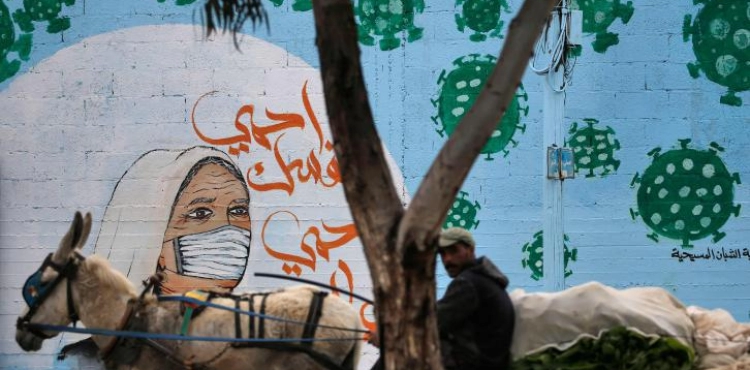Refugee Mahmoud Abu Jbara is optimistic about the new year, hoping that his life conditions, which have deteriorated sharply, like the majority of refugees like him, in the Gaza Strip last year will improve.
Abu Jabara, who lives in the Shati refugee camp in Gaza, seeks to achieve his goals and develop his skills in the field of programming and designing websites, to help him improve his conditions.
Jabara, who studies computer engineering at a local university, told Xinhua that the year 2020 has witnessed more setbacks for them in various fields of life.
He adds that he faced great difficulties in his educational career due to the new Corona virus crisis, which cast a negative shadow on his daily life and to develop his professional capabilities to enhance his opportunities for self-employment remotely.
Jabara notes that the educational process has completely stopped most of the year 2020, after Hamas declared a state of emergency and imposed repeated closures as part of measures to confront Corona disease.
Universities and schools in Gaza were closed as part of a series of preventive measures to confront Corona disease, which the sector recorded its first infections in March 2020 for returning travelers, and then began to spread locally last August.
Abu Jabara complains that remote education has hindered the completion of his studies as a result of the continuous power outages and poor internet service in the camp, which prevented him from being able to advance in his field of study and thus start work.
The young man was planning with his colleagues at the university to start a program of programming and designing websites, but they were not successful in achieving this due to the "difficult" conditions they had suffered in light of the Corona crisis.
Abu Jabara highlights that he lives in one of the largest refugee camps, which is considered one of the most densely populated areas, and the fear of the spread of Corona disease was great, which reflected its negative effects on their psychological condition.
Al-Shati refugee camp is known for its overcrowding, limited space, and lack of recreational and social facilities.
In many cases, residents have had to build additional floors with cramped space to accommodate their families, often without an organized design.
International organizations estimate that more than 80% of the refugees in the Gaza Strip depend on international aid for their lives.
Refugees constitute more than half of the Gaza Strip´s population of nearly two million people.
Abu Jabara asserts that the poor economic and living conditions of refugees like him in Gaza are driving a growing sense of frustration and despair.
Despite this, Abu Jabara aspires to achieve his goals in 2021, taking into account the changes surrounding him, whether political, economic or social, and hopes for the imminent end of the Corona disease crisis.
This optimism is shared by the young Ismail Abu Rayala, another university student who is a refugee from Al-Shati Camp, who has been forced to stop studying since the outbreak of Corona disease in the coastal sector.
Abu Rayala, 20, told Xinhua that his father, who works as a salesman in public markets, lost his job due to the frequent closures in the Gaza Strip, which prompted him to stop his studies at the university because he was unable to pay university fees.
He adds, "2020 was the worst year I lived, and I thought that I would lose all of my dreams and goals that I was working hard to achieve."
Nevertheless, Abu Riyala believes that 2021 will be better than its predecessor with the easing of the precautionary and preventive measures imposed on the sector, enabling him to help his father in work and earn money.
According to the Palestinian Popular Committee Against the Siege on Gaza, the average daily per capita income of the residents of the Strip does not exceed $ 2, which is the worst in the world.
The deterioration of the conditions of Palestinian refugees was compounded last year, with the worsening of the financial deficit of the United Nations Relief and Works Agency (UNRWA), which depends entirely on aid.
The Director-General of the Refugee Affairs Department of the Palestine Liberation Organization, Ahmed Hanoun, describes the conditions of refugees in the Palestinian camps as "difficult and dangerous" in light of the high rates of poverty, unemployment and the spread of the Coronavirus disease.
Hanoun told Xinhua that UNRWA, which represents a lifeline for Palestinian refugees, "is under an Israeli-American attack by draining financial resources in the context of liquidating the refugee issue."
Hanoun expresses the hope that the new year will witness changes in the field of the refugee issue with the arrival of a new US administration and the re-injection of the necessary financial aid to UNRWA to enable it to fulfill its full services.
UNRWA provides life-saving services to about 5.6 million Palestine refugees in its five fields of operation that include Jordan, Lebanon, Syria and the West Bank, including East Jerusalem and Gaza.












